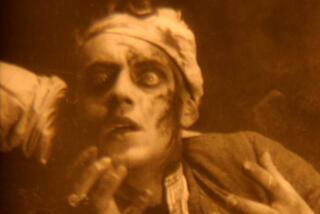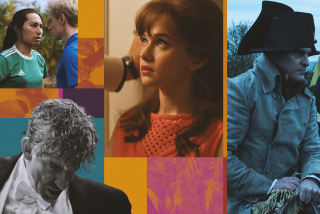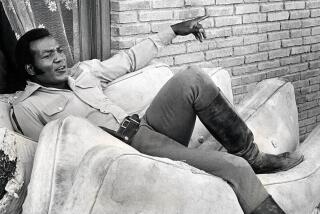Silent Movie Offers Program of ‘20s Collectibles
- Share via
The Silent Movie is presenting a different program each night tonight through Saturday at 8 in connection with Cinecom, a film collector’s convention taking place at the Hollywood Roosevelt Hotel. Among the offerings are Gregory La Cava’s 1928 “Feel My Pulse” (tonight), William C. de Mille’s 1921 film of Zona Gale’s “Miss Lulu Bett” (Thursday), Cecil B. DeMille’s 1926 “The Volga Boatman” (Friday, with Gaylord Carter at the organ) and the 1926 “It’s the Old Army Game,” with W.C. Fields and Louise Brooks (Saturday, again with accompaniment by Carter).
If you missed “Feel My Pulse” when it screened at the Silent Movie last January, you have another chance to catch this delightful precursor to the screwball comedies of the ‘30s, to which La Cava contributed such classics as “She Married Her Boss” (1935) and “My Man Godfrey” (1936). An effervescent Bebe Daniels plays an overprotected, naive heiress who decides to check out a small island that is an almost forgotten part of her inheritance. It is the site of a sanitarium (in actuality the Phineas Banning mansion in Wilmington) that is serving as the headquarters of rumrunner William Powell and his gang (which has been infiltrated by handsome reporter Richard Arlen). There’s much merriment as Powell and his thugs pretend to be doctor and patients, respectively, and the film is as much a tonic for the audience as the adventure and romance is for Daniels.
Just as a Hollywood-style happy ending did not prevent the George Stevens-Katharine Hepburn “Alice Adams” from capturing the desperation of small-town family life for a young woman of intelligence but little opportunity, the same is true for “Miss Lulu Bett.” We tend to sentimentalize the past with its rosy image of cozy domesticity, but it could be living hell for women dependent upon their relatives to shelter them. This is especially true of Lulu (Lois Wilson, in a complex portrayal similar to those of Lillian Gish), a virtual slave in the household of her sister (Mabel Van Buren) and brother-in-law (Theodore Roberts), who constantly ridicules Lulu for being plain while his wife expects her to do all the cooking and cleaning. If the false escape that presents itself to Lulu seems inescapably dated, the film, which was preceded by both a novel and a play of the same name, still stings with its honesty. William C. de Mille was never as prolific or as famous as his flamboyant brother Cecil, but “Miss Lulu Bett” reveals him to be a deft, sensitive craftsman concerned with the realities of everyday life on an intimate scale.
Set against the advent of the Russian Revolution, “The Volga Boatman” is a typical Cecil B. DeMille extravaganza, overflowing with melodrama and filled with splendor. In the title role, William Boyd dreams of freedom from slave-like servitude, which he believes is drawing near, and catches the eye of the elegant Princess Vera (Elinor Fair, later Mrs. Boyd), who is motoring with her fiance Prince Dimitri (Victor Varconi). When revolution catches up with the anguished triangle that develops among these three, the result is one of DeMille’s grand spectacular climaxes. With its Byzantine Deco sets and Fair’s Adrian gowns, “The Volga Boatman” exemplifies the eternal Hollywood paradox of the most sophisticated form combined with the most naive and elementary content. The result here, as in countless other instances, is highly entertaining.
It would be hard to improve upon Louise Brooks’ own description of “It’s the Old Army Game” as “deliciously vulgar and mean-spirited.” She has the exceedingly nominal role as the “counter attraction” at a small-town Florida drugstore owned and operated by W.C. Fields’ Elmer Prettywillie, one of Fields’ patented misanthropes who is gulled by city slicker William Gaxton into joining him in a fraudulent real estate scheme. Although often hilarious in its unashamedly nasty, anarchic way, it rambles mightily and is but a prop for Fields to do his usual shtick. It was directed by Edward Sutherland, who became Brooks’ husband, and was filmed extensively in Ocala, Fla., and on the E.T. Stotesbury estate in Palm Beach, with interiors shot at Astoria.
Information: (213) 653-2389.
More to Read
Only good movies
Get the Indie Focus newsletter, Mark Olsen's weekly guide to the world of cinema.
You may occasionally receive promotional content from the Los Angeles Times.








